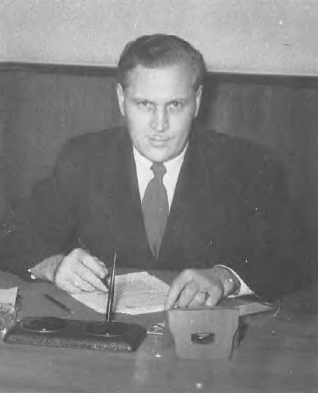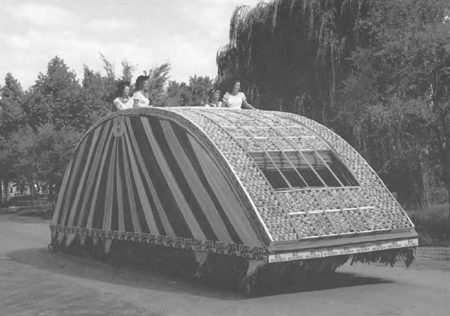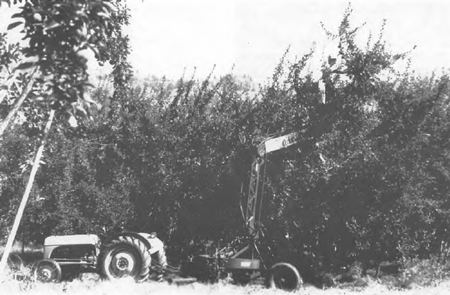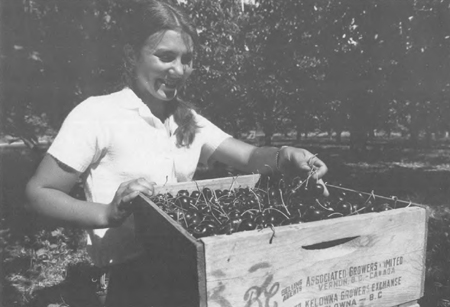News & Events More |
Struggling Along
Pooling reforms, pushed by Garrish, corrected some of the disparities of returns to growers, encouraging better quality. Prices picked up somewhat, reaching $1.32 return per bushel to the grower for the 1952 crop, but then they trailed off again, dropping to $.72 for the 1955 crop.50 Another freeze in November, 1955, killed many young trees planted after the 1950 freeze.51 "It just seemed like an endless succession of minidisasters overwhelming us, with the market kicking hell out of us in between times." Growers were restive and unhappy with conditions. A.K. Loyd, after a period of ill-health, resigned as President and General Manager of Tree Fruits on April 4, 1955.55 R.P. "Tiny" Walrod became general manager of both B.C. Fruit Processors and B.C. Tree Fruits, while L.G. Butler was named temporary president of Tree Fruits. 
But changes in management of the agency did not satisfy those growers who felt that the scheme of central selling itself was at fault for the low returns they were receiving. A few growers came out in vociferous opposition; others were simply uncertain. At the 1956 convention five resolutions were submitted, all calling for some sort of investigation, and it was finally decided to request a Federal Royal Commission. H. Corbishley of Penticton explained why growers felt an investigation was needed: Fundamentally, there is only one reason why we growers want a Royal Commission, and that is the indisputable fact that in the midst of a booming economy, we are not afraid to admit we are going broke. . . . Regardless of our acreage, or regardless of our ability as orchardists, we were losing money. . . . Growers who had looked at their selling agency and their B.C.F.G.A. with a contented eye now began to regard the whole setup critically; and they were amazed at what they saw on the surface. They saw a top-heavy grower organization which appeared to be directing marketing policy. They saw a sales agency which, because of no clear definition of responsibility, appeared to take orders from wholesalers and seemed to lack the initiative to get out and sell to all responsible buyers, large and small. They saw an antiquated packing system with a great variation between houses as to quality and condition of pack, and they saw a pooling system which was a veritable nightmare, and something they could never understand. Vignette: Giraffes and GirettesW.E. "Ted" Thornton-Trump arrived in Oliver in 1944, after his discharge from the Canadian Army, "with $200 and an old jalopy to his name". He opened a one-man machine shop in Oliver, and became interested in applying his engineering design ability to the fruit industry after he acquired the Okanagan franchise for a pneumatic pruning machine. If pruning could be mechanized, why not other orchard operations? Trump attacked the problem of getting the worker into operating position by looking for a replacement for the heavy and slow orchard ladder. He first constructed a crude hydraulic lift tower, but this was unsuitable for orchard use because it could not get right into the tree. 
Trump's solution was a double-boom hydraulic lift, which allowed the raised platform to go among and over branches. His first version of this, the "Giraffe", was designed to be towed by an orchard tractor and draw its power from the tractor's power take-off. The first experimental Giraffe was tested in the summer of 1951, and commercial production began in November of that year, with the Giraffe selling for $2000. The disadvantage of the Giraffe was that it needed two operators, one to drive the tractor and the other on the aerial boom. Trump addressed this problem, and in 1956 he brought out the single-boom "Girette", which was self-powered and self-propelled by a nine horsepower aircooled motor. This machine was much more useful; it and similar models are still manufactured today. Trump, meanwhile, found himself in financial difficulties after the 1955 freeze slowed his sales to fruit growers. He was threatened with bankruptcy, but worked his way out of the hole by diversifying into production of man-lifters for other industries. By 1962, his factory at Oliver employed a hundred workers and was producing fourteen models of Giraffe (including one truckmounted model which could reach the top of a twelve story building), four models of Girette, three of Snorkel (designed for fire-fighting), as well as other machinery such as tree tillers and an air-blast sprayer. Trump machines were sold in 43 countries around the world. A fire in 1962 destroyed the factory in Oliver; Trump rebuilt and resumed production, but the business was later sold. Girettes are now manufactured by Northside Steel Fabricators Ltd. of Kelowna. The Executive was unable to get a federal Royal Commission, and declined to act on a motion from the Southern District Council calling for investigation by a business consultant. Disgruntled growers approached Frank Richter, MLA, who indicated that the provincial government would be willing to set up a provincial Royal Commission if it was shown that a majority of growers wished it. A resolution requesting such was formulated by the Penticton local and circulated to the other locals of the B.C.F.G.A.; within a short time over fifty-one per cent of growers had indicated their agreement to the request. 
In response, on December 21,1956, Dean E.D. MacPhee of the UBC Department of Commerce was appointed by the provincial government as sole Commissioner of the Royal Commission on the Tree-fruit Industry of British Columbia.55 It was not an action friendly to the B.C.F.G.A. and organized marketing. As John Flail recalls, "bluntly speaking, he was appointed by 'Wacky' Bennett because Dean MacPhee-and he acknowledged it to some of us-had no use for co-ops. Contact Us Hours: 9am - 4pm weekdays. t: 250-762-5226 |

